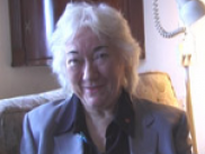Interview HF05

Age at interview: 72
Brief Outline:
Rheumatic fever aged 15. Subacute endocarditis 1966. Aneurysm 1970. Mitral valve replaced 1995. Diagnosed with heart failure in her early 40's.
Background:
Retired special needs teacher; married with 2 children.
More about me...
Childhood rheumatic fever affected her heart in adult life.
Childhood rheumatic fever affected her heart in adult life.
SHOW TEXT VERSION
PRINT TRANSCRIPT
Anyway, we came home but I had to walk a long way so eventually when I got home the doctor came, I was really quite ill. And so it was diagnosed as rheumatic fever with all the complications. Which does end up you know, as I learnt, with valvular heart problems. Anyway it took a long time to get over that but I did eventually, of course, sort of live a relatively normal life but I could never run again or do anything like that. But one learned to live with it and I was told never to marry, never to have children. But of course that is a long time ago, in the 1940s. But I didn't do sport or anything which I had loved before. But I managed and then I finally left home and went to live in London, because I lived up in Derbyshire. And lived in London, 'cause I was determined to get away 'cause they were looking after me a bit too much. (I'm cutting out an awful lot...) And so I had a bed-sit and thoroughly enjoyed living in London but you know even then I used to get palpitations sometimes and daren't tell anyone, you know and I daren't tell my parents because they I would have been home straight away.
Anyway, so really from then, things deteriorated slowly. I was told never to have children and I lost 2 full-term babies, actually, but I did manage to have 2 children full-term and we adopted a child. What can I say, you know, life just' when I was busy I was just exhausted' I was exhausted all the time, actually. It was just one life of exhaustion but I was OK.
She describes how wonderful she felt after her mitral valve was replaced.
She describes how wonderful she felt after her mitral valve was replaced.
SHOW TEXT VERSION
PRINT TRANSCRIPT
And you know, the most wonderful thing in the world is to have a new valve or whatever, I am sure for other people, other things but that is really how it came about and that's 7 years ago. And since then, I mean another one is playing up a bit now but even so, you know, I mean I'm so much better than I was. For the few years before I couldn't drive for three years before, just couldn't, it wouldn't have been safe, you know and all this sort of thing. So really that is the build up and what I have got to now.
Being in a support group helped her because she shared problems with other people.
Being in a support group helped her because she shared problems with other people.
SHOW TEXT VERSION
PRINT TRANSCRIPT

